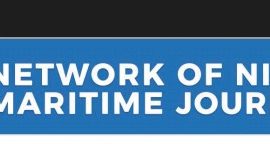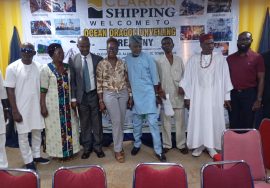
SEREC Urges Balanced, Competency-Based Licensing For Customs Agents
![]()
SEREC Urges Balanced, Competency-Based Licensing For Customs Agents

Fwdr Dr.Eugen Nweke Head,Research SEREC
By Frank Odinukaeze
The Sea Empowerment and Research Center (SEREC) has called on the Nigeria Customs Service (NCS) to adopt a fair, tiered, and competency-based licensing system for customs agents, chandlers, and bonded terminal operators, cautioning against sharp fee hikes that could hurt small and medium-sized enterprises.
In a position paper in its August bulletin Vol.ii titled :
” EFFECTIVENESS AND EFFICIENCY OF LICENSE REGULATIONS FOR CUSTOMS AGENTS”
addressed to the NCS management, SEREC emphasized that a well-structured licensing framework would boost professionalism, efficiency, and compliance in the customs clearance process. The group proposed a tiered system that categorizes licenses by service type, experience, and specialization, with ongoing training requirements for license holders.
SEREC advised against using recapitalization or mergers as a route to licensing reform, describing them as lengthy and potentially disruptive. Instead, it recommended broad stakeholder consultations involving the Nigeria Shippers Council and the Council for the Regulation of Freight Forwarding in Nigeria (CRFFN).
Key suggestions the group made include:
Balanced licensing fees with lower rates for smaller operators.
Competency-based requirements focusing on customs procedures, tariff classification, and valuation.
Periodic review of licensing rules to maintain efficiency.
Fair compensation for agents as an incentive to uphold compliance.
According to SEREC,the benefits of a well structured licensing framework are immense:
“*Promotes Professionalism: A well-structured licensing framework can promote professionalism and efficiency in the customs clearance process.
*Enhances Compliance: Licensing can help ensure compliance with customs regulations, reducing the risk of delays, fines, and penalties.
*Economic Benefits: By promoting a professional and efficient customs clearance process, licensing can contribute to increased economic competitiveness and growth.”
The paper also outlined potential license categories, from standard and advanced to specialized and multi-tasking operational licenses for high-risk operations like bonded warehouses and economic zones.
SEREC’s Head of Research, Forwarder Eugene Nweke, concluded that licensing reform should be collaborative and inclusive to benefit regulators, operators, and the trading public.









